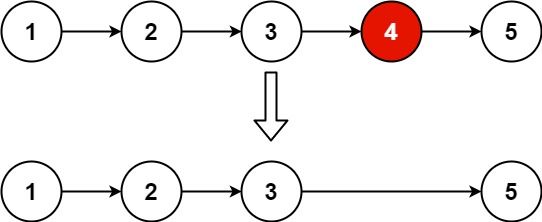Given the head of a linked list, remove the nth node from the end of the list and return its head.
Follow up: Could you do this in one pass?
Example 1:
Input: head = [1,2,3,4,5], n = 2 Output: [1,2,3,5]
Example 2:
Input: head = [1], n = 1 Output: []
Example 3:
Input: head = [1,2], n = 1 Output: [1]
Constraints:
- The number of nodes in the list is
sz. 1 <= sz <= 300 <= Node.val <= 1001 <= n <= sz
# Definition for singly-linked list.
# class ListNode:
# def __init__(self, val=0, next=None):
# self.val = val
# self.next = next
class Solution:
def removeNthFromEnd(self, head: ListNode, n: int) -> ListNode:
dummy = ListNode(next=head)
fast = slow = dummy
for _ in range(n):
fast = fast.next
while fast.next:
slow, fast = slow.next, fast.next
slow.next = slow.next.next
return dummy.next/**
* Definition for singly-linked list.
* public class ListNode {
* int val;
* ListNode next;
* ListNode() {}
* ListNode(int val) { this.val = val; }
* ListNode(int val, ListNode next) { this.val = val; this.next = next; }
* }
*/
class Solution {
public ListNode removeNthFromEnd(ListNode head, int n) {
ListNode dummy = new ListNode(0, head);
ListNode fast = dummy, slow = dummy;
while (n-- > 0) {
fast = fast.next;
}
while (fast.next != null) {
slow = slow.next;
fast = fast.next;
}
slow.next = slow.next.next;
return dummy.next;
}
}/**
* Definition for singly-linked list.
* struct ListNode {
* int val;
* ListNode *next;
* ListNode() : val(0), next(nullptr) {}
* ListNode(int x) : val(x), next(nullptr) {}
* ListNode(int x, ListNode *next) : val(x), next(next) {}
* };
*/
class Solution {
public:
ListNode* removeNthFromEnd(ListNode* head, int n) {
ListNode* dummy = new ListNode(0, head);
ListNode* fast = dummy;
ListNode* slow = dummy;
while (n--) {
fast = fast->next;
}
while (fast->next) {
slow = slow->next;
fast = fast->next;
}
slow->next = slow->next->next;
return dummy->next;
}
};/**
* Definition for singly-linked list.
* type ListNode struct {
* Val int
* Next *ListNode
* }
*/
func removeNthFromEnd(head *ListNode, n int) *ListNode {
dummy := &ListNode{0, head}
fast := dummy
slow := dummy
for n > 0 {
fast = fast.Next
n -= 1
}
for fast.Next != nil {
slow = slow.Next
fast = fast.Next
}
slow.Next = slow.Next.Next
return dummy.Next
}/**
* Definition for singly-linked list.
* function ListNode(val, next) {
* this.val = (val===undefined ? 0 : val)
* this.next = (next===undefined ? null : next)
* }
*/
/**
* @param {ListNode} head
* @param {number} n
* @return {ListNode}
*/
var removeNthFromEnd = function(head, n) {
const dummy = new ListNode(0, head);
let fast = dummy, slow = dummy;
while (n--) {
fast = fast.next;
}
while (fast.next) {
slow = slow.next;
fast = fast.next;
}
slow.next = slow.next.next;
return dummy.next;
};# Definition for singly-linked list.
# class ListNode
# attr_accessor :val, :next
# def initialize(val = 0, _next = nil)
# @val = val
# @next = _next
# end
# end
# @param {ListNode} head
# @param {Integer} n
# @return {ListNode}
def remove_nth_from_end(head, n)
dummy = ListNode.new(0, head)
fast = slow = dummy
while n > 0
fast = fast.next
n -= 1
end
while fast.next
slow = slow.next
fast = fast.next
end
slow.next = slow.next.next
return dummy.next
end
